If Customs officers are not well-trained, proficient in professional operation and do not perform consistently across the sector, it will hinder and cause obstacles in their daily work. Therefore, training and retraining must be considered as a priority, including on-the-job training so that customs officers are able to be proficient in professional skills and practice in each job position.
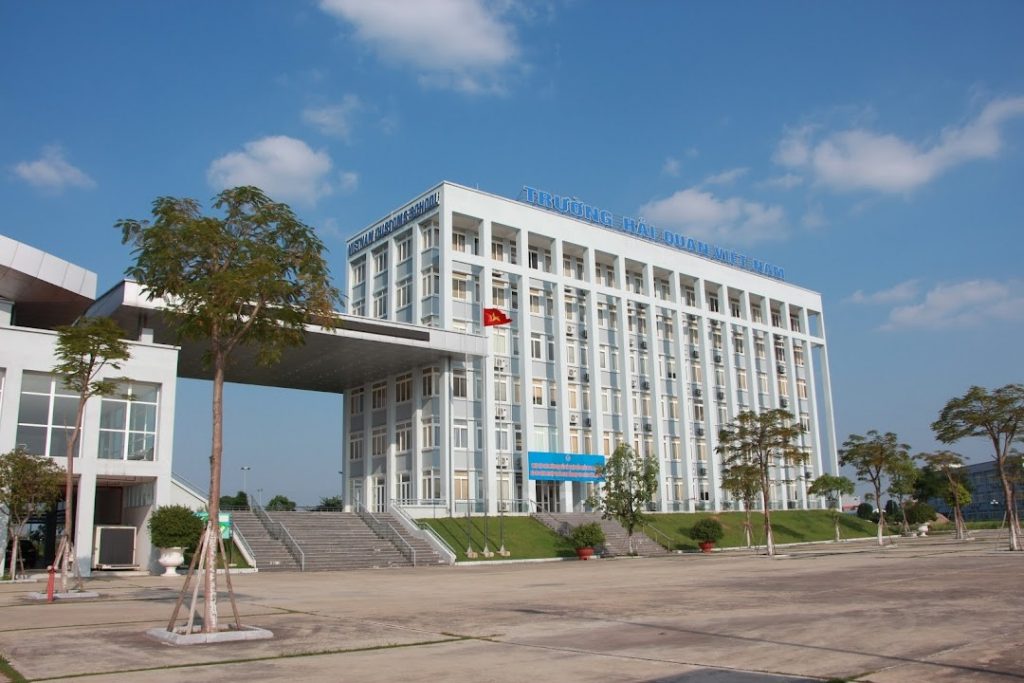
Vietnam Customs School
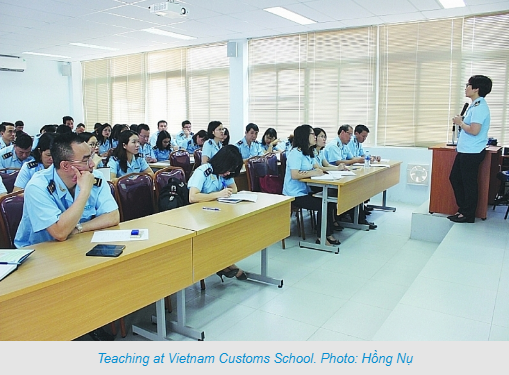
Comprehensive and intensive professional training
According to the assessment of General Department of Vietnam Customs, the highlight of the general customs professional training program is that the content of the program has been revised and supplemented with new and comprehensive knowledge to serve working requirements such as integrity and code of ethics in customs, martial arts, use of weapons, physical training, field training.
The duration of the program is adjusted to increase from 1.5 months to 5 months; the learning content basically complements and provides basic knowledge of professional operations, ensuring Customs officers are capable of performing tasks in all working positions.
Besides the highlights and professional training, the General Department of Vietnam Customs also frankly acknowledged that the program and documents of the general customs professional class were still spread out and unbalanced between theory and practice. Currently, the practical part was mainly done through actual observation at the border gate and the customs branch where the customs clearance procedures were carried out with a duration of only 2-3 days. At Vietnam Customs School, there is no customs branch model so that students cannot practice. Therefore, it is necessary to further enhance the practical time through the provision of visual aids or virtual reality training models.
On the other hand, it is possible to consider reducing the theoretical content following the distribution ratio between theory of 30% and practice of 70% instead of the ratio of theory from 50% to 80% and practice from 20% up to 50% as in some topics. Documents, textbooks and teaching methods have not focused on training skills to work in the direction of specific guidance for each working position.
Currently, the Vietnam Customs School has cooperated with professional units under the General Department of Vietnam Customs to develop intensive training programs and annual training sessions with a duration of 3-5 days. The intensive professional training classes according to working positions have partly met the requirements of updating new knowledge, methods and skills to handle specific problems in customs operations; and guiding skills in implementation and use of tools and equipment related to professional activities.
Job rotation between similar operations
Currently, the Party Committee of the General Department of Vietnam Customs is developing a draft resolution on strengthening the leadership of the Party in order to improve the quality of human resources to meet the requirements of implementing the Customs Development Strategy for the 2021-2030 period.
Commenting on the draft resolution, in order to build and develop human resources, meeting the requirements of implementing the Customs development strategy for the 2021-2030 period, the Customs sector needed to raise awareness, roles and responsibilities of management leaders at all levels in improving the capacity of customs officers and employees in the unit.
To develop the idea of training experts at two levels (General Department of Vietnam Customs and Regional Customs), it is necessary to choose a pilot project of rotating between similar working positions, ensuring the expertise of customs officers throughout the course of their career.
Customs officers performing in tax management positions could rotate to post-clearance audit and examination, thereby providing systematic and trans-disciplinary training for customs officers from the entrance stage and becoming a Customs expert.
The Customs sector would be able to build a source of experts in each professional field, realizing the goals set out in the process of building and developing human resources in order to meet the requirements of tasks, contribute to building a regular and modern Customs sector, meet the requirements of customs reform and modernization in general, and implement Digital and Smart Customs.
The General Department of Vietnam Customs (GDVC) issued the scheme on training and improving skills for customs officers for 2021-2015 on September 22. Deputy Director of the Personnel and Organization Department Bui Ngoc Loi spoke to Customs News about the scheme.
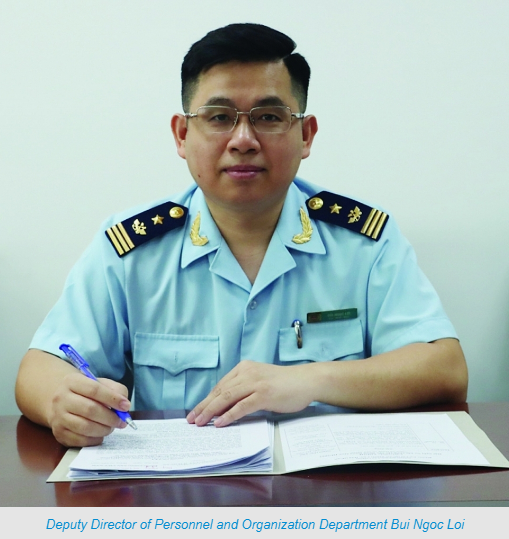
What solutions has Vietnam Customs provided to improve qualifications of customs officers?
The GDVC has offered many solutions to enhance qualifications of customs officers to meeting the requirements of customs reform and modernization.
Firstly, the GDVC assess the actual status of officers, thereby identifying training needs, developing training plans to build a contingent of officers with high professional status towards professionalism, civilization and discipline.
Second, the country’s top customs agency has reformed methods of human resource management based on the capacity and the working position. It also supplements and amends regulations on personnel management as the basis for human resources of the Customs sector in the new situation.
Third, the GDVC has completed the teaching materials system that is updated with the professional process of Vietnam Customs as well as international standards on modern customs management.
Fourth, the country’s top customs regulator has organized training courses under titles of officers in accordance with standardized teaching contents and materials. It has also reformed the form of training such as strengthening on-the-job training, developing online training system in line with reality to enhance the efficiency of training and save time and costs for units and officers.
What is the role of training and the retraining in the development of human resources towards Digital Customs and smart Customs model?
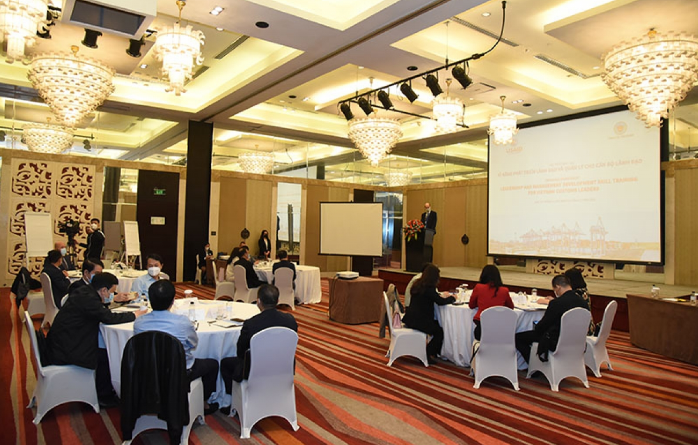
An overview of the training course aimed at improving the leadership and management skills of 15 senior customs officials within the framework of the United States Agency for International Development (USAID)’s Trade Facilitation Program. (Photo: baodautu.vn)
The GDVC has focused on renovating contents of training and retraining programs; applied modern equipment in teaching, developed teaching staff; completed policies on training and retraining and strengthened domestic and foreign cooperation in this area. Therefore, the GDVC will soon have a contingent of effective leaders, and sufficient officers that have mastery of knowledge, skills, and abilities in performance in the new period.
Despite the complicated development of the Covid-19 epidemic, Vietnam Customs has been developing an online training form to serve the requirements of capacity building of Vietnamese Customs officers. Vietnam Customs School has developed and applied the online training system (LMS – Learning Management Customs), initially achieved a lot of success, regularly organized training classes in 2020 and 2021. Plan on the future is continue to upgrade and to teach the courses in 2022. In addition, Vietnam Customs also focuses on developing electronic lectures and training part-time instructors to teach online.
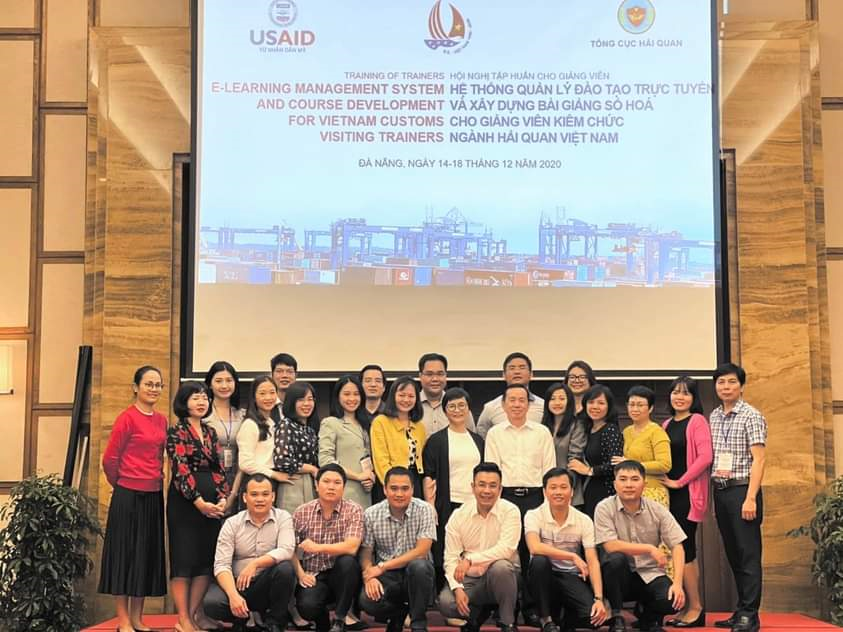
Training of trainers: E-Learning management system and course development for Vietnam Customs visiting trainers within the framework of the United States Agency for International Development (USAID)’s Trade Facilitation Program.
The goals set by the Customs sector in the Scheme on training and improving skills for customs officers for 2021-2015?
The GDVC sets goals for 2021-2025 as follows:
The Customs sector develops customs officers at all levels that perform tasks in an experienced and professional manner, and master modern technology and equipment. The sector arranges sufficient officers with consistent structure and associated with the needs of working positions and the capacity of each officer, meeting the modern customs management model.
The GDVC develops professional experts at the general department and regional customs levels who master foreign languages and operational skills and are capable of chairing and administering international conferences.
The top country’s customs agency implements training and retraining for officers under their working positions to meet the knowledge and skills standards of the capability framework and ranks and grades.
The GDVC also implements in-depth training of knowledge and skills for officers to meet requirements on customs reform and development in the new period.
The sector focuses on training and promotes online training; develops the Vietnam Customs School as a modern and professional school that has facilities and management methods meeting standards of the regional training center, and has experienced lecturers satisfying the requirements of the country and the World Customs Organization (WCO), and capable of participating in international teaching.
Vietnam Customs equips with visual teaching aids, the model of customs branch, virtual reality training platform, and upgrades the function of online training system to enhance training quality and meet requirements of the WCO’s Regional Training Center.
The GDVC builds the job rotation model for training and retraining among unit levels and departments in the same units, and in each work to improve qualifications and skills in performing tasks and widen practical experiences for officers, leaders and planning leadership positions.
What targets have been set by the GDVC by 2025?
The GDVC has set targets in the scheme by 2025 as follows:
The Customs sector focus on improving knowledge according to title and rank. By 2025, 100% of customs leaders will be trained, meeting requirements of the working positions; 80% of officers subject to the leadership planning are trained to satisfy conditions and standards of the working positions.
Up to 30% of deputy directors and 15% of division heads, deputy heads and equivalent positions and 15% of officers working in specialized departments under the GDVC must rotate and transfer to work in local units for training. Provincial and municipal customs departments must provide training plans to ensure that the leaders and officers will have comprehensive knowledge of advisory and practice performance.
100% teaching materials of eight professional areas, including import-export duty, customs management and supervision, post-clearance audit, anti-smuggling, risk management and handling offences, customs verification and inspection, are compiled to ensure quality and approved by competent agencies.
100% of part-time teachers are trained in specialized knowledge according to the teaching area and pedagogical skills; 100% of full-time teachers are trained with in-depth knowledge of one of six main professional areas and pedagogical skills.
90% of newly recruited officers are trained in general customs operations within a year after being recruited, meeting the conditions and standards for the job position.
The GDVC improves facilities to launch training, re-training and in-depth training programs in both face-to-face and online forms.